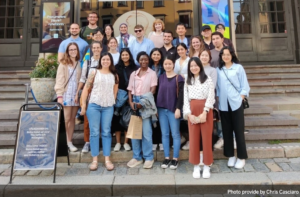The U of T-Karolinska Institutet’s International Exchange in Developmental and Perinatal Biology

In an increasingly interconnected world, international exchanges can play a pivotal role in opening participants’ eyes to new perspectives, as well as in planting the seeds for fruitful future collaborations.
The University of Toronto has joined Sweden’s Karolinska Institutet in co-leading one such exchange program that brings together students and faculty members in the fields of developmental and perinatal biology – important areas of study in which both academic institutions have significant expertise. Researchers in these fields seek to trace the origins of human disease back to the period of time from conception to age five (or the so-called “first 2000 days of life.”)
More than 800 learners have participated in the exchange program since its establishment in 1996.
Stephen Matthews — a professor of physiology, obstetrics and gynaecology, and medicine at U of T’s Temerty Faculty of Medicine, as well as the director of research for the Alliance for Human Development at Sinai Health’s Lunenfeld-Tanenbaum Research Institute — was one of the exchange program’s first U of T faculty participants and now serves as its academic director.
“The U of T-Karolinska Institutet exchange offers students a really great opportunity to learn from leaders they wouldn’t otherwise have the chance to connect with,” Matthews says. “It’s also essential in helping participants begin to create their own global networks — a fundamental skill in the world of health research.”
He explains how, each year, nearly two dozen leaners and faculty members from each institution take part in the week-long annual exchange. The experience alternates each year between Toronto and Stockholm.
Each day of the exchange kicks-off with a series of lectures tied to a wide range of themes in developmental and perinatal biology, such as stem cells, early embryo development, the placenta and environmental impacts on fetal development. And, in addition to taking part in social activities, as well as visits of local health care and industry partner sites, students also prepare for the exchange by pursuing independent research, which is then presented orally or via a poster. They then receive valuable feedback on their work from faculty members from both globally-renowned institutions.
“It is like presenting at a scientific conference,” says Matthews. “It’s important for trainees to have opportunities like this early in their careers – especially at an international level. It can be a very valuable experience that they may not have outside this framework.”
Matthews also notes how the program purposefully brings together learners from many different levels, including undergraduate and graduate life science students, as well as clinical and post-doctoral fellows.
“As someone who runs a fundamental molecular biology lab, but who also works on translating these findings into patient care innovations, this is personally very meaningful,” he says. “It’s so valuable to bring together the clinical and research worlds and to open up new perspectives.”
The exchange’s goal of encouraging and preparing participants for careers in the academic health sciences has also been further enhanced by the two-year long Mats Sundin Fellowship in which two postdoctoral fellows — one each from U of T and the Karolinska Institutet — have the opportunity to travel away from their home institutions for a more extended period. During the longer-term exchange experience, fellows train alongside leading scientists, scholars and clinicians while investigating pressing questions related to early childhood development.
The fellowships were established in 2013 by Mats Sundin, the Swedish former captain of the National Hockey League’s Toronto Maple Leafs. They reflect his passion for early childhood development and health, as well as his deep ties to both Canada and Sweden.
“These two programs are all about creating a pathway for future researchers,” says Matthews. “Pursuing a career in the academic health sciences is no easy task – requiring long training commitments in increasingly challenging funding environments. These opportunities help trainees persevere and see themselves in these roles.”
Making Connections
Program alumnus Christopher Casciaro first heard about the U of T-Karolinska Institutet exchange program after joining Matthews’ lab as a new doctoral student in 2018.
Now, he also works as the lead student coordinator for the exchange program — organizing presentations and social events in the year the program happens in Toronto, and assisting students from U of T connect with their Swedish peers in the years the program is hosted in Europe.
Casciaro explains that the exchange program has allowed him to connect with a broader pool of academic and industry leaders and to gain their unique perspectives on his research investigating how developing embryos may be impacted by a father’s life experiences before conception (for example, stress or environmental adversity).
He also notes how it’s provided him with the opportunity to learn more from faculty from both institutions about their own career journeys, as well as to be exposed to a different health system from the Canadian model in which he’s based.
“It’s a great opportunity to meet experts who have finished their degrees in reproductive sciences and have launched successful careers,” he says. “But it is also eye opening to learn about how Sweden approaches health care. For example, they have a really strong sense of family and emphasize taking care of parents as well as a way of improving child health. It lets you see health policy in action.”
“By the time the week is over and you’ve done all these lectures, workshops and social events together, you become a really close-knit group,” he adds. “Many of the people that I first met on the program three or four years ago, I am still in touch with. That’s a connection that will last a lifetime as we continue in our careers.”
